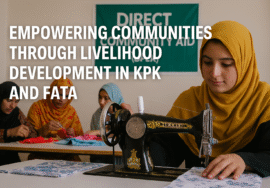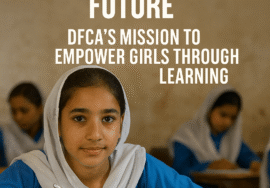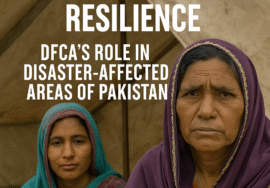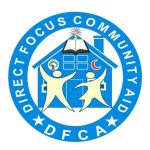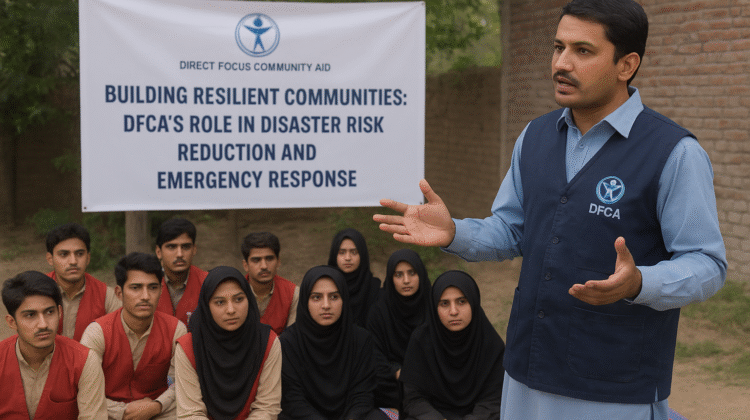
Building Resilient Communities: DFCA’s Role in Disaster Risk Reduction and Emergency Response
Introduction: Why Community Resilience Matters
In a country like Pakistan—where natural disasters are not a question of “if” but “when”—building resilient communities is not just a strategic goal, it’s a humanitarian necessity. From catastrophic earthquakes to devastating floods, vulnerable populations in areas like Khyber Pakhtunkhwa (KPK) and the formerly Federally Administered Tribal Areas (FATA) are often the first to suffer and the last to recover.
This is where Direct Focus Community Aid (DFCA) has stepped up with unwavering dedication, transforming crisis into opportunity and despair into development. DFCA disaster response and resilience work is not just about reacting to emergencies—it’s about preparing communities to withstand and bounce back stronger.
DFCA Disaster Response and Resilience
Disasters strike without warning, but DFCA’s readiness isn’t accidental. Through its Community-Based Disaster Risk Management (CBDRM) model, DFCA focuses on grassroots preparedness, proactive education, and sustainable rebuilding.
Whether it’s earthquake relief in Bajaur or flood recovery in Charsadda, DFCA is on the ground, actively engaging the community, providing lifesaving aid, and ensuring recovery strategies are both inclusive and long-lasting.
Challenges Faced by Vulnerable Areas
In disaster-prone regions like KPK and FATA, the challenges are multilayered. The lack of infrastructure, limited healthcare, low literacy, and cultural constraints all amplify the impact of natural hazards. Additionally, climate change has escalated the frequency and severity of these disasters.
For instance, remote mountain communities often face communication blackouts during emergencies. Women and children are disproportionately affected due to restricted mobility and lack of access to emergency information.
DFCA tailors its disaster management approach to address these deeply entrenched challenges.
DFCA’s Mission in Emergencies
With its motto rooted in serving humanity, DFCA’s emergency mission emphasizes:
- Timely and efficient response
- Equity and inclusion in relief delivery
- Sustainable recovery and preparedness
- Empowerment through education and awareness
Their initiatives span from distributing emergency kits and food supplies to providing emergency shelter, healthcare access, and psychosocial support for trauma-affected families.
Early Warning Systems
An effective response begins with early warnings. DFCA collaborates with meteorological departments and local media to disseminate risk alerts, especially to hard-to-reach areas.
Community volunteers receive training to act as first points of contact, ensuring that disaster warnings translate into early evacuations and life-saving decisions.
Community-Based Disaster Risk Management (CBDRM)
CBDRM is the backbone of DFCA’s strategy. The idea is simple yet powerful: when communities lead their own disaster preparedness, the response is faster, more effective, and culturally relevant.
DFCA trains Community Emergency Response Teams (CERTs) in:
- Basic first aid
- Safe evacuation techniques
- Communication protocols
- Risk mapping and hazard identification
These grassroots responders serve as the first line of defense during emergencies.
DFCA’s Role in Earthquake and Flood Relief
Over the past decade, DFCA has built a proven track record in disaster recovery:
- During the 2010 floods, DFCA provided emergency food, clean water, and shelter in Charsadda and Nowshera.
- In earthquake-hit Bajaur, they organized mobile medical camps, psychosocial counseling, and temporary classrooms for children.
- Post-2022 floods, DFCA executed rapid needs assessments and delivered WASH (Water, Sanitation, Hygiene) kits to thousands.
These efforts are not one-time interventions—they’re embedded in long-term community relationships and trust.
Emergency Training for Volunteers
Volunteers are DFCA’s greatest asset. Their training programs cover:
- Search and Rescue
- Disaster Psychology
- Basic Life Support (BLS)
- Camp Management
These sessions are conducted in collaboration with Pakistan National Volunteer Movement (PNVM) and local universities, ensuring wide reach and relevance.
Women and Children in Disasters
Women and children are often overlooked in disaster response, but not by DFCA. Their gender-sensitive approach ensures:
- Safe spaces for women and girls
- Women-only response teams
- Child-friendly learning environments
- Access to menstrual hygiene products
By empowering women as active participants—not passive victims—DFCA brings equity into emergency action.
Rapid Response Units
DFCA’s Rapid Response Units are always on standby, especially during monsoon and earthquake seasons. Equipped with tents, first aid, food supplies, and mobile phones, these teams reach the epicenter of disaster zones within hours.
Their efficiency was evident during the 2022 floods, where DFCA reached submerged villages in Tank and D.I. Khan within 24 hours.
Partnerships with Government and INGOs
DFCA collaborates with:
- NDMA and PDMA
- Aga Khan University
- Muslim Charity
- ActionAid Pakistan
- Leonard Cheshire Disability
These alliances strengthen resource mobilization and amplify the reach of DFCA’s disaster efforts.
Prepositioning of Relief Supplies
Disasters demand immediacy. DFCA has developed strategically located prepositioning hubs stocked with essentials—shelter kits, dry food rations, clean water tanks, and emergency medical supplies. These hubs enable swift distribution to disaster-affected zones without delay, reducing reliance on slow supply chains.
Post-Disaster Recovery Programs
Relief is just the beginning. DFCA excels in post-disaster recovery by helping families rebuild their homes, livelihoods, and mental well-being. Programs focus on:
- Restoring agricultural tools and seeds
- Rehabilitating schools and health centers
- Offering trauma counseling for survivors
- Rebuilding WASH infrastructure to prevent disease outbreaks
This holistic strategy ensures communities not only survive but thrive after a crisis.
Education in Emergencies
Education is often the first casualty in a disaster. DFCA works to prevent this by setting up Temporary Learning Centers (TLCs) in relief camps, offering continued learning for displaced children. These centers are equipped with:
- Teaching kits
- Stationery and books
- Psychological support staff
- Trained emergency teachers
By keeping education alive, DFCA preserves hope and normalcy during chaotic times.
Case Study: Response to 2022 Floods
During the catastrophic 2022 floods, DFCA launched a multi-pronged emergency response across Charsadda, DI Khan, and Tank. Their actions included:
- Distributing over 15,000 food packages
- Deploying mobile health units
- Installing clean drinking water facilities
- Supporting 3,000 families with shelter and hygiene kits
This initiative earned recognition from district authorities and local communities alike for its transparency, speed, and effectiveness.
Leveraging Local Knowledge for Resilience
DFCA respects indigenous wisdom. By incorporating local knowledge into risk mapping, evacuation plans, and shelter construction, they ensure strategies are culturally grounded and more likely to succeed.
In Kurram, for instance, DFCA engaged tribal elders in planning flood defenses using traditional stone embankments combined with modern reinforcements.
Mental Health Support in Crises
DFCA integrates mental health into emergency response—an area often ignored by mainstream relief agencies. Through mobile counseling clinics, community therapy sessions, and training for local health workers, DFCA helps survivors manage grief, PTSD, and anxiety.
Communication Strategy During Crisis
Whether through SMS alerts, local radio stations, or community mobilizers, DFCA ensures timely communication during emergencies. Transparency is maintained through public dashboards and open forums that provide updates, instructions, and beneficiary feedback channels.
Volunteer Mobilization Strategy
DFCA has established a nationwide network of trained volunteers. Their Volunteer Mobilization Strategy includes:
- Identification and mapping of active volunteers
- Capacity building in DRR (Disaster Risk Reduction)
- Integration with Pakistan National Volunteer Movement (PNVM)
- Annual refresher trainings and simulation drills
DFCA’s Success in Jalozai IDP Camp
One of DFCA’s proudest moments was its extensive work in the Jalozai Camp for Internally Displaced Persons (IDPs). From water sanitation and child education to mobile health clinics and trauma support, DFCA served as a lifeline for thousands displaced by conflict.
Their commitment to dignity-centered humanitarian aid has left a lasting mark on displaced communities.
Future-Focused Resilience Planning
DFCA doesn’t just react—they plan ahead. Their forward-looking DRR strategy includes:
- Promoting climate-resilient infrastructure
- Training youth in green technologies
- Investing in renewable energy and eco-shelters
- Integrating AI-based early warning systems
Climate Change and Disaster Preparedness
The climate crisis is no longer a looming threat—it’s a present-day challenge. DFCA is at the forefront of climate adaptation, educating communities about:
- Soil conservation
- Rainwater harvesting
- Alternative livelihoods
- Sustainable farming practices
Their DRR interventions now double as climate-resilience platforms.
Innovation in Emergency Response
DFCA is using tech for good. From drone-based disaster assessments to mobile data collection and e-distribution vouchers, their innovations increase efficiency and accuracy in aid delivery.
Resource Allocation and Transparency
Every rupee spent is accounted for. DFCA’s financial management systems include:
- Independent audits
- Donor dashboards
- Monthly financial reporting
- Beneficiary verification mechanisms
This ensures high donor confidence and continuous support from international agencies.
Lessons Learned from Past Disasters
DFCA’s operational strategies are ever-evolving, guided by lessons learned in the field:
- Faster deployment through pre-trained volunteers
- Reduced logistical errors via digital tracking
- Better community trust through transparent communication
Policy Advocacy and Institutional Engagement
DFCA actively contributes to national policy dialogues, advocating for:
- Integration of DRR in school curricula
- Gender-inclusive emergency protocols
- Stronger local government capacity in disaster zones
Community Empowerment through Knowledge
The ultimate goal? Self-reliant communities. DFCA achieves this by:
- Hosting DRR awareness camps
- Printing culturally sensitive IEC (Information, Education, Communication) materials
- Running school clubs focused on safety and resilience
Media and Visibility in Emergencies
DFCA’s collaboration with journalists, social media influencers, and local radio enhances the visibility of crises and mobilizes faster support from donors and the general public.
DFCA’s Long-Term Emergency Strategy
With a roadmap extending to 2030, DFCA envisions:
- Every community having its own emergency response team
- Integrated climate-smart villages
- Regional DRR hubs that support policy, planning, and implementation
Conclusion: From Vulnerability to Strength
Disasters reveal vulnerabilities—but also the strength of collective action. DFCA stands as a beacon of hope in the chaos, helping communities move from fragility to resilience. With a blend of compassion, strategy, and grassroots participation, DFCA continues to redefine what disaster response looks like in Pakistan

